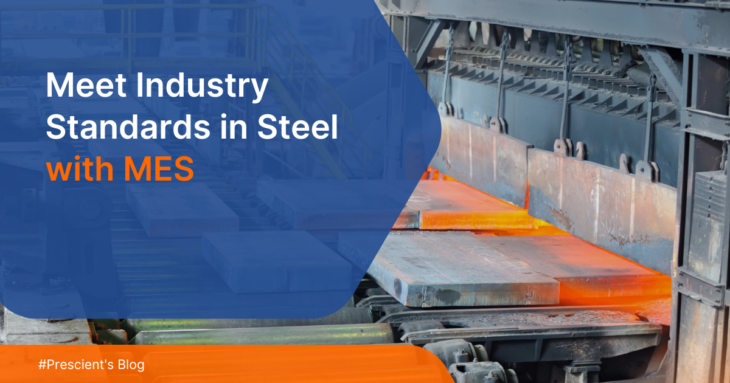MES and Compliance: Meeting Industry Standards in Steel Manufacturing
Steel manufacturing as an industry is complicated and highly regulated as steel finds applications across all industrial sectors. Steel plants have many moving parts starting from raw material sourcing to final product delivery. When so many processes are going on, it’s easy to deviate from the process and cause poor quality output, accidents, inefficiencies and ultimately financial losses. Compliance with industry standards is crucial to maintain the steel production process safe and profitable. However, meeting those standards requires strict adherence to the procedures at every stage. It is especially difficult when dealing with outdated systems and manual processes. The Manufacturing Execution System (MES), with its superior compliance monitoring capabilities has been a groundbreaking upgrade which ensures quality of work and safety in production. In this article, we’ll take a look at how MES compliance in steel industry works. Industry Standards in Steel Manufacturing The steel industry is governed by a vast range of standards and regulations that define how the quality, safety, and sustainability of steel production should be. These standards are set by different international organizations such as: Some common standards in steel manufacturing include: As can be seen from the requirement of different standards, steel manufacturing has to fall within acceptable criteria of the impact it has on everything. Manufacturers have adhered to the standards even from the days prior to digital transformation manufacturing. But today, with steel manufacturers moving to Industry 4.0, an MES system is a necessity to maintain a high degree of compliance. Challenges in Meeting Compliance in Steel Manufacturing Legacy systems and manual processes in steel manufacturing have their own set of challenges. These are: 1. Inefficient Documentation and Record-Keeping Manual documentation and record-keeping processes are prone to errors. Manufacturers often find compliance gaps because of the mistakes made while writing and copying. The mistakes also show up in audit findings and cause regulatory issues. 2. Lack of Real-Time Traceability and Tracking Without real-time tracking, steel manufacturers have a difficult time monitoring the production processes. The lapses can delay the identification of quality issues and lead to the recall of products. This increases the risk of non-compliance, and quality defects and also poses safety hazards. The bottom line is that it affects customer trust and brand reputation. 3. Inadequate Quality Control Measures Manual quality control measures often lead to variability in product quality. Whole batches then have to be recast again to the right specifications, leading to increased rework costs. Without effective quality control, steel manufacturers risk non-compliance with industry standards and customer specifications. The resulting waste impacts the business’s reputation and revenue. 4. Insufficient Training and Awareness Among Employees Insufficient training and awareness among employees can lead to quality issues and non-compliance, especially when manufacturers hire newcomers. Even with proper training, employees may not fully understand regulatory requirements, industry standards, or company procedures. There is often a ramp-up time before they are familiar with things. This gap gives room for mistakes to be made. 5. Limited Visibility into Production Processes Limited visibility into production processes hinders real-time monitoring of lapses in procedures and protocols. Without clear visibility, steel manufacturers have a hard time identifying bottlenecks, quality issues, and compliance gaps. How MES Addresses Compliance Challenges The MES compliance in steel industry is enabled by the numerous advantages the system brings, such as: 1. Real-Time Data Collection and Tracking With MES, it’s possible to gather data as the process happens, ensuring accuracy and reliability. Instead of manual data entry or delayed reporting by personnel on the ground, the IIoT sensors installed in the plants give a steady flow of data. Real-time data collection and tracking enables operators to respond quickly to quality issues, production bottlenecks, and compliance gaps. 2. Automated Workflows and Quality Control Checks Manual processes are prone to errors and inconsistencies. MES automates workflows and quality control checks, which can increase consistency and accuracy. Automated checks and balances guarantee that products meet quality standards and regulatory requirements. Even data from quality testing, which goes into the system soon after the test, is being analyzed for compliance. 3. Electronic Documentation and Record-Keeping Most technicians and workers will agree that paper based documentation is a compliance nightmare. MES replaces manual records with electronic documentation, which makes accessibility easy and keeps the data accurate. Electronic records are also tamper-proof, version-controlled which increases security. 4. Traceability and Genealogy When quality control fails as a result of non-compliance, recalls of finished product batch take a toll on the costs. MES provides complete traceability and genealogy, which enables rapid identification of affected products. With MES, operators can track raw materials, production processes, and finished goods in real-time. Having this level of traceability can help with prompt recall of the first few products before a whole batch of defective steel is produced. Closing Thoughts The MES compliance in steel industry is a level up as the software comes with features such as quality management, inventory management, production scheduling, reporting and analytics and more. Implementing an MES is a necessity to stay competitive in the growing steel industry today. To learn how you can gain a competitive advantage, check out FactoryCONNECT, a comprehensive MES solution. Get in touch with our team and ask for a demo today!
Read More